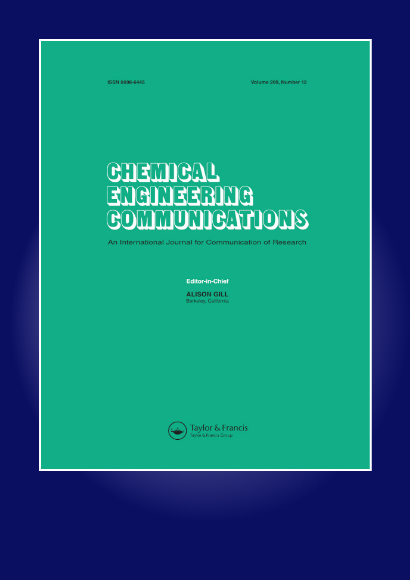Modes of interaction and thermodynamic behavior of aggregation of CTAB + BSA mixtures in diols media: effects of diols composition and temperature
IF 2
4区 工程技术
Q3 ENGINEERING, CHEMICAL
引用次数: 3
Abstract
Abstract The micellization of cetyltrimethylammonium bromide (CTAB) and bovine serum albumin (BSA) mixture has been studied conductometrically in aq. solutions of different diols (1,2-propanediol (1,2-PrD), 2,3-butanediol (2,3-BD), and 1,5-pentanediol (1,5-PD)) media over the temperature range from 298.15 K to 323.15 K to gain insight into the mode and degree of interaction amongst the investigated constituents. The critical micelle concentration (cmc) values of the CTAB + BSA mixtures were attained initially low but enhanced with the rise in temperature in all the media studied. The values of the CTAB + BSA mixtures in the different diols media followed the order: The degree of micelle ionization (α) increased with increasing carbon chain length of diols and temperature. The Gibbs free energy ( ) values associated with the micellization of the CTAB + BSA mixture were negative and revealed a lowering of the spontaneity of micellization with increasing carbon chain length of the diols. The enthalpy ( ) and entropy ( ) changes of micellization revealed that the micellization was exothermic and mainly an enthalpy-controlled process in aq.1,2-PrD and 2,3-BD media while the process being endothermic, and entropy controlled in the 1,5-PD medium. The contribution of the solvent to the thermodynamic parameters was assessed from free energy of transfer ( ), enthalpy of transfer ( ), and entropy of transfer ( ) values. The enthalpy–entropy compensation parameters were also studied and discussed with proper reasoning.二元醇介质中CTAB + BSA混合物聚集的相互作用模式和热力学行为:二元醇组成和温度的影响
摘要在298.15 K ~ 323.15 K的温度范围内,用电导法研究了十六烷基三甲基溴化铵(CTAB)和牛血清白蛋白(BSA)混合物在不同二醇(1,2-丙二醇(1,2- prd)、2,3-丁二醇(2,3- bd)和1,5-戊二醇(1,5- pd))介质的水溶液中的胶束作用,以了解所研究组分之间的相互作用模式和程度。CTAB + BSA混合物的临界胶束浓度(cmc)值最初较低,但随着所研究的所有介质温度的升高而升高。CTAB + BSA混合物在不同二元醇介质中的值依次为:随着二元醇碳链长度的增加和温度的升高,胶束电离度(α)增大。与CTAB + BSA混合物胶束化相关的吉布斯自由能()值为负,表明随着二醇碳链长度的增加,胶束化的自发性降低。胶束化的焓()和熵()变化表明,在aq1,2 - prd和2,3- bd介质中胶束化是放热的,主要是焓控制的过程,而在1,5- pd介质中胶束化是吸热的,熵控制的过程。通过自由传递能()、传递焓()和传递熵()值来评估溶剂对热力学参数的贡献。并对焓熵补偿参数进行了研究和讨论。
本文章由计算机程序翻译,如有差异,请以英文原文为准。
求助全文
约1分钟内获得全文
求助全文
来源期刊

Chemical Engineering Communications
工程技术-工程:化工
CiteScore
5.50
自引率
4.00%
发文量
80
审稿时长
6 months
期刊介绍:
Chemical Engineering Communications provides a forum for the publication of manuscripts reporting on results of both basic and applied research in all areas of chemical engineering. The journal''s audience includes researchers and practitioners in academia, industry, and government.
Chemical Engineering Communications publishes full-length research articles dealing with completed research projects on subjects such as experimentation (both techniques and data) and new theoretical models. Critical review papers reporting on the current state of the art in topical areas of chemical engineering are also welcome; submission of these is strongly encouraged.
 求助内容:
求助内容: 应助结果提醒方式:
应助结果提醒方式:


